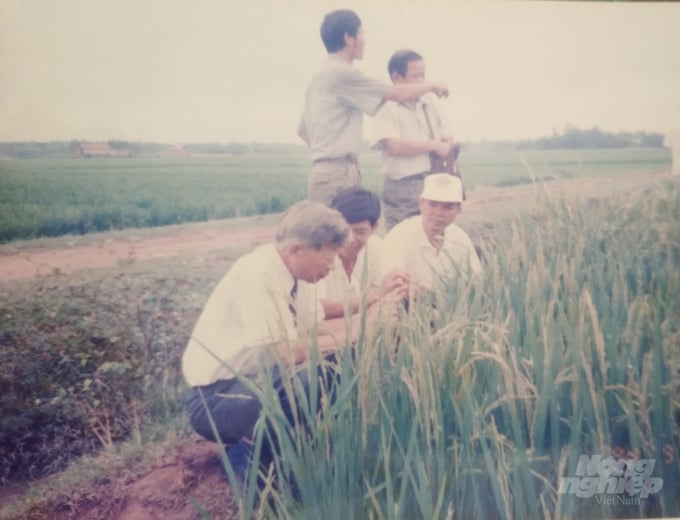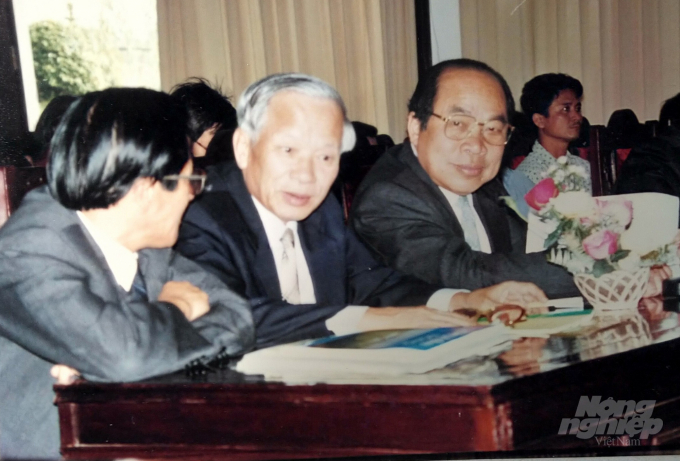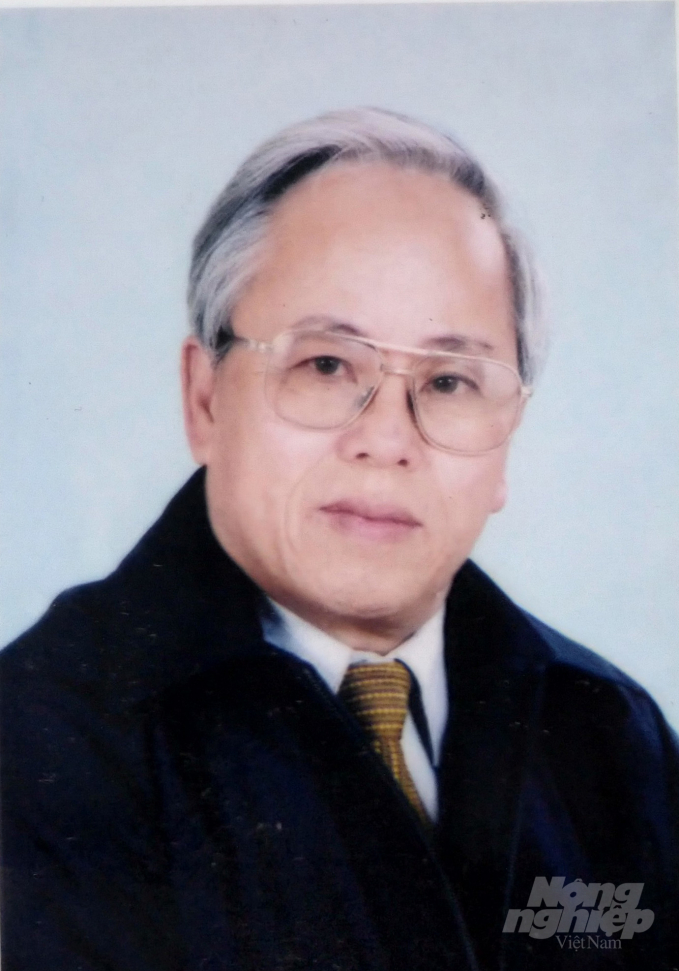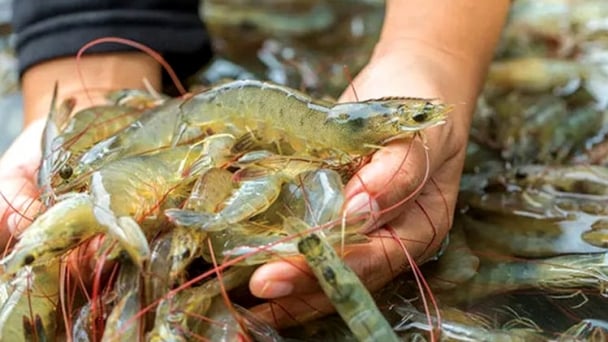May 23, 2025 | 20:01 GMT +7
May 23, 2025 | 20:01 GMT +7
Hotline: 0913.378.918
May 23, 2025 | 20:01 GMT +7
Hotline: 0913.378.918
Mistakenly planted… commercial hybrid rice
Back then, I was the Head of the Cultivation Office of the Production Department, Ministry of Agriculture and Food Industry (later Ministry of Agriculture and Rural Development).
Minister Nguyen Cong Tan assigned me some rice and told me: “This is a very high-yield rice variety in China. Go work on it!” To Mr. Tan, science is not only borderless, but it is also an achievement for all humankind. Therefore, Vietnam has to take a shortcut to catch up with the achievements of Chinese science. If it is done sequentially from the bottom to the top, success would still be far from reach.
The first few hybrid rice seeds were brought back to be planted in Dan Phuong, formerly Ha Tay in the 1989 crop. The plants grew very well, bet beautifully when flowering, but when ripe, there were problems in many forms. I made a report to Minister Tan: "The rice is good, but the segregation is severe, so it can't be used". Then I read the documents and turned out it was hybrid rice, so I told him: "This may be a commercial hybrid rice that can't be grown but only eaten. Upon seeing how good that rice is, our embassy officials may have thought it was also good for cultivation”.
After a while, Mr. Tan went to Quang Ninh and saw that the rice fields in Mong Cai were very good, yield up to 8-9 tons/ha. The Director of the Department of Agriculture explained that this was a Chinese hybrid rice variety that they bought and planted. The Ministry asked Quang Ninh to buy some seeds, then gave them to me to bring to Phu Lap of Phu Xuyen district, Ha Tay province, to sow in a 55.3ha area. Minister Nguyen Cong Tan told farmers that this is a new hybrid rice variety introduced into our country with high yield potential, encouraged them to accept and adapt to the new variety.

Minister Nguyen Cong Tan (first person on the left) visited hybrid rice in the former Ha Tay. Photo: Document.
Every two weeks Mr. Tan made me go down there with him. There were days when the sun shone harshly in the field, with just us wading in the field, meeting the duck herders. We asked, and this was their answer: "This is good rice, sir!" We returned after having finished our walk.
As a result, in that crop, the yield was 9.6 tons/ha while our normal rice was only about 5 - 5.5 tons/ha. Right after that, the Ministry held a production conference with representatives from Thua Thien - Hue provinces to the Northern provinces to attend to visit the hybrid rice fields to expand production in the next crops.
We were very excited after seeing the hybrid rice, and the next crop was followed by 22 provinces, the yield was 7.2 - 8.5 tons/ha, 20 - 30% higher when compared. That was the road to mass-produced hybrid rice in Vietnam, and I'm just Mr. Tan's "henchman".
"How did you see it there?"
From the results of hybrid rice cultivation in the former Ha Tay province, Mr. Tan directed the International Cooperation Department to contact FAO (United Nations Food and Agriculture Organization) in Hanoi to pose and issue a project on hybrid rice. Two Chinese experts came to help Vietnam, working in Dong Van farm, Ha Nam province.
After having acquired the budget, I had an opportunity to go to China's Hunan province to visit the rice field and was received twice by Mr. Yuan Long Ping, making me the first Vietnamese technical officer to meet the father of hybrid rice. Mr. Yuan Long Ping once said that he was researching “super rice”, yielding 14-15 tons/ha, not just simply stay at the moment.

Minister Nguyen Cong Tan (middle) in a conference.
When I returned, Mr. Tan asked: "How did you see it there?". “I’m terrified since there’s nothing they can not do: From the smallest, a needle, to the largest, a rocket that can cross the Great Continent. No joke”.
Back to the story, when Mr. Yuan Long Ping promised to help Vietnam in terms of hybrid rice, he sent many experts to train our technical officers, who later became extraordinary hybrid rice experts. Moreover, Mr. Yuan Long Ping and his experts also transferred technology to us by teaching us about the sterility line, the restorative line, how to cross-breed, when to sow the father and mother lines to match...
Vietnam has become a very good hybrid rice production technology recipient, from which many countries sought to learn. As a result, the hybrid rice area expanded, accounting for over 30% of winter-spring rice fields in the North, with some provinces bringing up to 60-65%, very high yield, which was proof of a breakthrough to ensure food security.

Mr. Quach Ngoc An (Former Deputy Department of Agriculture and Forestry Extension Department, Ministry of Agriculture and Rural Development). Photo provided by his family.
The achievements of Mr. Nguyen Cong Tan didn’t stop there.
Hybrid rice had already been put into production, but each year we could only do one winter-spring crop in the North. But the winter-spring crop is very hard to work on, some cold years even killed all the seedlings. At that time, in the South, Mr. Ngo Quoc Hong - a Chinese immigrant, and also the Director of Trang Nong Company, who was close to Mr. Tan, offered to cultivate hybrid rice.
Mr. Tan asked me to see if it was possible to grow hybrid rice in the South. I said: "I think it is possible, but the South doesn’t match with the direction for hybrid rice, as they have to make domestic rice varieties to serve the country's needs of fine dining or export".
But I still went to see Mr. Hong. He said he would help us produce hybrid rice not for the South but for the North. I wholeheartedly supported the idea. He was responsible for the budget, and I went down to encourage Long An province to find a production site. Since then, “the South produces, the North consumes” formula had been born, taking advantage of the stable climatic conditions in the South to remove the difficulties while producing hybrid seeds for the North.
Because hybrid rice brings so many practical benefits both in terms of production and science, we, including Nguyen Cong Tan, Quach Ngoc An, Le Hong Nhu...and other members in the research team were awarded the 2000 State Prize.
Rapid technology acquisition
Mr. Yuan Long Ping, the father of hybrid rice in China as well as the world, has always dreamed about producing a lot of food for countries with dificulties to ensure food security, including Vietnam.
Vietnam is close to China, therefore fortunate to have access to hybrid rice technology quickly. Currently, Vietnam has built the foundation of hybrid rice production, has a good staff team, such as Hero of Labor, Assoc. Prof. Dr. Nguyen Thi Tram, who had sold the copyright of TH3-3 for VND 10 billion. Vietnam also has had a Research and Development Center of Hybrid Rice under the Field Crops Research Institute.
Translated by Samuel Pham

(VAN) WWF, GIZ, IUCN, UNDP call for biodiversity conservation and sustainable development must be regarded as a unity in strategies for a green future.

(VAN) On celebration of International Day for Biological Diversity, Deputy Minister Nguyen Quoc Tri called for practical actions to address nature and biodiversity conservation.

(VAN) Dr. Hoang Thi Thanh Nhan – Deputy Director of the Nature and Biodiversity Conservation Agency – highlighted this on the International Day for Biological Diversity, May 22, 2025.
![Ho Chi Minh city adapts to climate change: [2] Accelerating action](https://t.ex-cdn.com/nongnghiepmoitruong.vn/608w/files/chiqk/2025/05/22/4024-4220-bien-doi-khi-hau-1-100626_766.jpg)
(VAN) Clearly recognizing the challenges posed by climate change, Ho Chi Minh city has swiftly shaped its policies and implemented practical solutions to adapt.

(VAN) Rice straw is no longer just a discarded byproduct, but it is becoming a green resource that helps farmers in the Mekong Delta reduce emissions and promote circular, sustainable agriculture.

(VAN) Other Effective Area-based Conservation Measures (OECMs) are solutions that contribute effectively to achieving the goals of the Kunming–Montreal Global Biodiversity Framework.

(VAN) A study assessing the carbon footprint of whiteleg shrimp farming in China shows the potential for carbon emission reduction through the use of renewable energy.